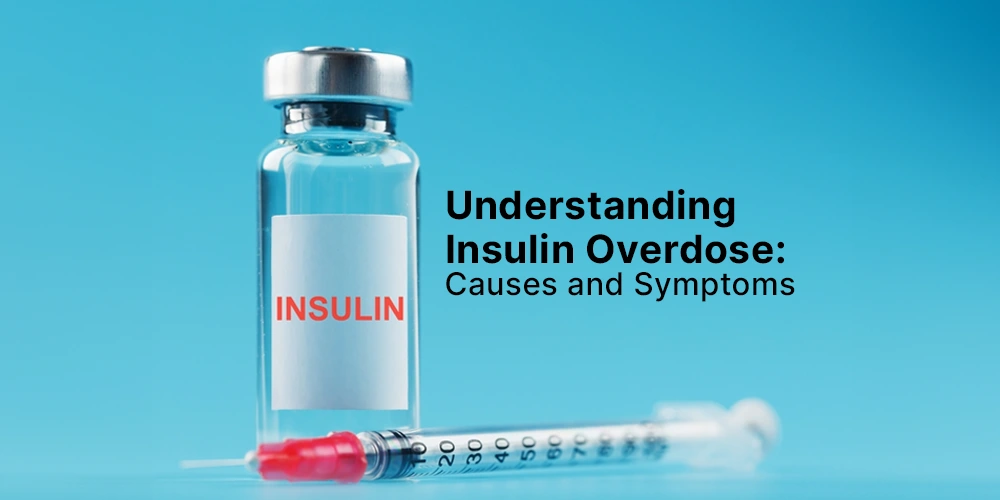Understanding Insulin Overdose: Causes and Symptoms

Insulin is a medicine used to help people with diabetes manage their blood sugar levels. Without it, managing diabetes would be unimaginable for some people, especially for people with type 1 diabetes.
Diabetes is a condition where the body has trouble handling sugar, with two main types: Type 1 and Type 2. In Type 1 diabetes, the body doesn’t make insulin, and in Type 2 diabetes, the body doesn’t use insulin properly.
Both types need careful management to keep blood sugar levels stable, which is why insulin is so important for people with diabetes. It helps keep their blood sugar in check, which is essential for staying healthy.
But it’s MOST IMPORTANT to use the right amount of insulin. Taking too much can lead to an insulin overdose, which can be dangerous.
In this blog, we’ll look at what happens if you take too much insulin, why it happens, and the signs to watch out for.
Insulin Overdose – What Is It?
An insulin overdose occurs when an excessive amount of insulin is taken, potentially disrupting your body’s normal functions. Understanding the signs and risks associated with an insulin overdose is vital for your well-being.
What are the Symptoms of Insulin Overdose?
The insulin overdose symptoms relate to low sugar or hypoglycemia (high blood sugar levels), and the severity of symptoms or the intensity will depend upon the severity of hypoglycemia, which can be:
- Shakiness: A pronounced trembling or shakiness.
- Sweating: Excessive sweating, even in cool conditions.
- Fast heartbeat: An abnormally rapid heartbeat.
- Hunger: An intense and persistent feeling of hunger.
- Weakness: A profound loss of strength and energy.
- Blurry vision: Visual disturbances resulting in unclear vision.
- Confusion: A state of mental disorientation.
- Coma: A state of loss of consciousness.
To know your chances of Diabetes reversal, take the Diabetes Reversal TestDiabetes Reversal
Calculator
When can it be Seen the Insulin Overdose Symptoms?
Insulin overdose symptoms can be seen immediately or can be delayed depending on the type of insulin used and the amount taken.
1. Immediate – Short Acting
- Overdosing fast-acting insulin can cause hypoglycemia (low blood sugar) within 15 minutes of injection.
- Symptoms of hypoglycemia include shakiness, dizziness, anxiety, sweating, confusion, rapid heartbeat, and blurred vision.
- In severe cases, hypoglycemia can cause seizures, loss of consciousness, and even death.
2. Delayed – Long Acting
- Overdosing on long-acting insulin can cause delayed effects, which may be persistent and can last a few days to a week.
- Symptoms of hypoglycemia due to long-acting insulin overdose can be delayed and may not appear until several hours after the injection.
- In severe cases, hypoglycemia can cause disorientation, seizures, and even death.
If you suspect an insulin overdose, it is important to monitor your blood sugar levels closely and seek medical attention if necessary.
What are the Causes of Insulin Overdose?
Insulin overdose can occur due to various reasons, such as:
- Miscalculation of dosage
- Incorrect timing of doses
- Using the wrong type of insulin
It may also result from changes in diet or physical activity that affect blood sugar levels. Let’s learn more about what are the various causes of insulin overdose:
1. Accidental Insulin Overdose
Accidental insulin overdose happens when a person mistakenly takes too much insulin. This can be due to confusion about dosage instructions, misreading the insulin syringe, or forgetting a previous dose and taking multiple doses simultaneously.
2. Intentional Overdose
An intentional insulin overdose occurs when a person deliberately takes more insulin than needed. This can be a result of psychological distress or a cry for help.
It’s important to seek immediate medical and psychological support in such cases.
Treatment Options for Insulin Overdose
Treatment for insulin overdose includes consuming fast-acting carbohydrates like glucose tablets, juice, or candy to quickly raise blood sugar levels.
In severe cases, medical intervention may be required, including intravenous glucose or glucagon injections. Continuous monitoring of blood sugar levels is crucial until they stabilize.
Reduced HbA1c by HALF in 6 months


6.6%
Happy members
EMI
Guarantee
4.8/5
Diabetes Prime Program
Accidental Overdose – How Does It Happen?
Sometimes, an accidental overdose occurs due to errors in insulin administration, such as mistakenly taking a double dose. These accidents can have severe consequences, including the risk of life-threatening situations.
Points to consider:
Insulin overdose is commonly observed in:
- Elderly people with eye complications or visual disturbances.
- Wrong selections of syringe or vial for the prescribed insulin.
What to Do if You’ve Taken Too Much Insulin?
If you experience these symptoms or suspect an insulin overdose:
- First, check your blood sugar, followed by consuming a source of rapidly absorbing sugar, such as fruit juice or candy.
- Call your doctor immediately, especially if the overdose is severe and requires hospitalization.
How to Prevent an Insulin Overdose?
- Always stick to the prescribed insulin dosage recommended by your healthcare provider.
- Double-check your insulin amounts before administration.
- Maintain a consistent insulin schedule.
- Check the label/leaflet before use.
- Read your prescription carefully before taking it.
- Consult your healthcare provider if you have any doubts before starting your insulin.
How We At Fitterfly Can Help You?
Insulin is important, especially for people with Type 1 diabetes. However, taking too much insulin can cause hypoglycemia, which can be life-threatening if not treated quickly.
If you notice any symptoms of insulin overdose, monitor your blood sugar closely and consult with your doctor immediately. To prevent an overdose, follow your prescribed dosages, double-check insulin amounts, and stick to a consistent schedule.
Diabetes is essentially a lifestyle disease or condition. We believe that if the right changes are made to your lifestyle, diabetes can be treated most effectively.
Thats why, at Fitterfly, we help our members manage diabetes with minimal or no medication, focusing mainly on lifestyle changes related to food, fitness, sleep and stress.
Our Diabetes Prime Program offers expert advice, personalized plans, and comprehensive support to help you achieve better health and stable blood sugar levels. And all this from the comfort of your home!
By focusing on diet, exercise, and continuous blood sugar level monitoring, we help you take control of your diabetes in the most natural way.
For expert guidance on managing diabetes effectively, call one of our expert Program Advisors. Give us a missed call at 08068507599, and we will call you back.
This blog provides general information for educational and informational purposes only and shouldn't be seen as professional advice.
Frequently Asked Questions
How long does an insulin overdose last?
Ideally, it subsides in a few minutes of treating it; however, depending upon the severity of hypoglycemia, it may last longer.
Can you reverse an insulin overdose?
Yes, within a few minutes of overdose, you will be able to reverse the effects depending upon its severity.
How many units of insulin constitute an overdose?
There is no specific amount or units of insulin that constitutes an overdose, and it can vary from person to person.
Can an insulin overdose cause a heart attack?
An insulin overdose, in itself, is not linked to heart attacks. However, dangerously low blood sugar levels resulting from an overdose can lead to serious health complications.
Is insulin overdose serious?
Yes, insulin overdose is serious and can lead to severe hypoglycemia, which can be life-threatening if not treated immediately.
What happens if you take too much insulin?
Taking too much insulin can cause your blood sugar levels to drop dangerously low, leading to symptoms like shakiness, sweating, confusion, seizures, and even loss of consciousness.
Can you recover from insulin overdose?
Yes, you can recover from an insulin overdose with prompt treatment. Consuming fast-acting carbohydrates and, in severe cases, receiving medical intervention such as intravenous glucose or glucagon injections can help stabilize blood sugar levels.
How long does an insulin overdose last?
The duration of an insulin overdose depends on the type of insulin taken and the amount. Effects can last from a few hours to an entire day, requiring continuous monitoring and treatment.
What is the antidote for insulin overdose?
The antidote for insulin overdose is glucose. Consuming fast-acting carbohydrates like glucose tablets, juice, or candy can quickly raise blood sugar levels. In severe cases, intravenous glucose or glucagon injections are administered by healthcare professionals.
What happens if you take insulin and don't need it?
Taking insulin when you don't need it can cause hypoglycemia (low blood sugar), leading to symptoms such as dizziness, confusion, fainting, and in extreme cases, coma or death.
What is the 3-day rule for insulin?
The 3-day rule for insulin typically refers to adjusting insulin doses based on blood sugar patterns observed over three days. If blood sugar levels are consistently high or low, doses may be adjusted after consulting with your doctor.
How late is too late for insulin?
Timing for insulin doses is MOST IMPORTANT for your diabetes management. If you miss your scheduled dose, taking it too late can fluctuate your blood sugar control. It's best to follow your prescribed schedule and consult your doctor if you miss a dose to determine the best course of action.
How to determine insulin dosage?
Your doctor is the best person to decide the insulin dosage based on your condition.




















